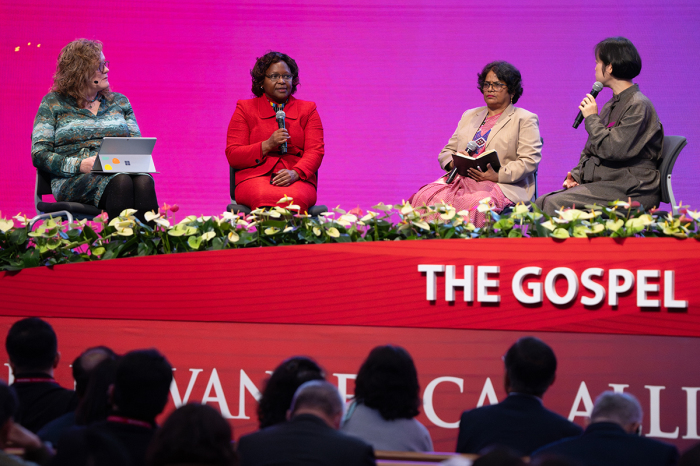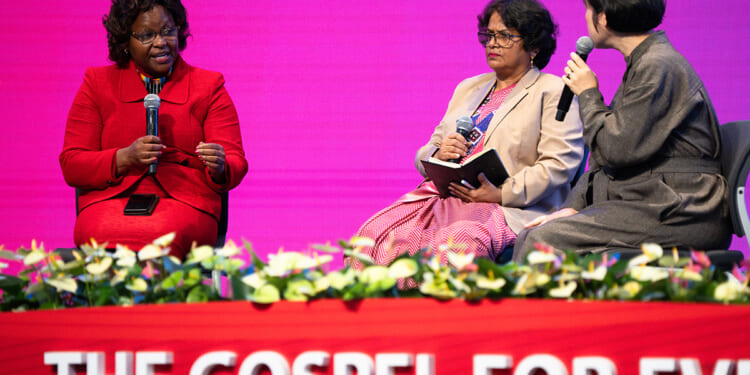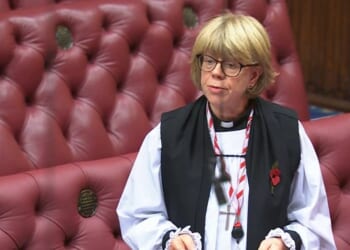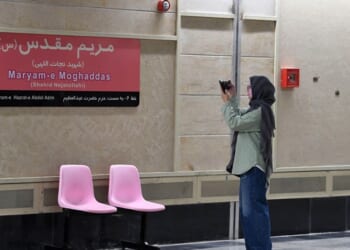
SEOUL, South Korea — Women and girls are easy targets for religious persecution, and their plight is often compounded when shunned by their own church communities after escaping their captors, say experts on gender-based persecution.
The vulnerabilities faced by Christian women who are part of the religious minority in South Asia and African nations were the focus of a panel moderated by Emma van der Deijl, the CEO of Gender and Religious Freedom, at the World Evangelical Alliance’s 14th General Assembly, held at SaRang Church last Tuesday.
Irene Kibagendi, executive director of the Pan African Christian Women Alliance, homed in on the abuses suffered by women in Nigeria, Sudan and the Democratic Republic of the Congo. Sharing the accounts of young women that have become all too common, she laid bare the reality that “they’re the easy targets.”
Kibagendi explained that girls are often kidnapped when they’re going to school and are subsequently forced to convert to Islam — a prevalent problem that has been reported by The Christian Post numerous times for more than a decade.
After being kidnapped and raped — often by multiple men — these young women lose their self-worth and identity. And when they manage to flee their captors and seek reunification and healing in the communities from which they were forcefully kidnapped, they often face rejection.
“Despite being persecuted for being a Christian, when they come back to the Church, they’re not accepted,” Kibagdendi lamented, noting that often upon their return, they’re either pregnant or have already given birth to children fathered by militants affiliated with terrorist groups, such as Boko Haram or al-Shabaab.
“They’re rejected by their families. Their husbands cannot accept them back. The Church cannot accept them back,” she added, pointing to the need for systems to allow for reunification and recovery instead of discarding the victimized women as outcasts in society.
According to van der Deijl, “It’s as if women and girls who are targeted now become an enemy of the Church. Or it’s as if the Church thinks that the blood of Christ isn’t strong enough to cleanse these women or to keep the Church pure.”
“The enemy wins when we allow the intended shame of persecution to bring division and rejection in the Church,” added van der Deijl, who frequently pointed to Satan’s plans to sow division among believers. “Instead, it is our responsibility to restore those who have gone through persecution with love and acceptance in the knowledge that their vulnerability and identity is safe in Christ. And this is not just true for women, but also for the men and children of our Church.”
In an earlier interview with The Christian Post about gender-based persecution, Sarah Cunningham, the chief operating officer at Open Doors US, spoke about the long-term psychological impact of persecution, including PTSD, anxiety and the social withdrawal of victims.
Women who’ve been raped are “carrying stigma and shame because of these kinds of hidden, secretive, very intimate violations against them,” she said. “And oftentimes, the long-term impact is to their psyche.”
Some women also fear that “something else equally violent could happen to them at any given moment,” Cunningham added, rendering feelings of “powerlessness,” causing them to withdraw from society.
Despite the discouraging circumstances, van der Deijl noted that some churches have been “stepping outside of the cultural norm” to walk alongside these women in need of recovery and reintegration into their families and society. Thus, placing blame on the perpetrator, not on the victim.
The Rev. Martha Das, general secretary of the National Christian Fellowship of Bangladesh, also addressed the cultural issues within churches operating in Christian-minority countries where followers of Jesus often face ridicule, discrimination and violence.
While some faith-based organizations are helping vulnerable Christians facing persecution in South Asia by providing food, shelter and work, Das told delegates gathered at WEA’s General Assembly that churches “want to be perfect” and are less likely to be open to providing assistance to people in “messy” circumstances.
“There’s not a place in their community to get care,” Cunningham told CP of many women who’ve been victimized in minority-Christian countries. “There’s no safe person to speak to necessarily about that physical trauma they experienced. And so they’re carrying that internally in a very hidden way.”
Kibagendi insisted that churches worldwide have a responsibility to help “integrate persecuted women and children back to the community without judging them.”
“We need the Church to become a rescue place or space for everybody who needs help,” she added. “We need to care more, and we need to look at those people who are going through shame so that we don’t inflict the same onto them.”
She continued, “The Church should also be prepared to respond to such cases and provide care groups to help, especially the young girls to be restored; that the dignity of the young girls and women be restored.”
The WEA General Assembly was hosted by the 60,000-member SaRang Church in the nation’s capital, and brought together over 850 Evangelicals from around the world.
The theme of the general assembly was “The Gospel for Everyone by 2033,” and many of the sessions focused on how this ambitious goal can become a reality with only eight years to go.
On the last day of meetings, delegates were presented with the WEA’s Seoul Declaration, a 15-page document crafted by an international group of theologians, including eight from South Korea. It offers Evangelical position statements on a range of issues, from gender and human sexuality to war, abortion, religious freedom, and continued divisions on the Korean Peninsula.
A spokesperson for the WEA said the statement was intended to be a “guiding post” for members, with carefully considered theological perspectives on key issues in the world today and “how the Church ought to have direction for the future.”

















